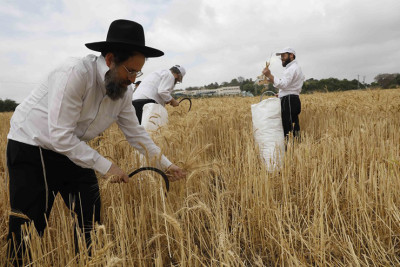
Parashat Ki Tavo, When You Come begins with the commandment about the first fruits of the seven species of plants for which Eretz Yisrael is famous, and about a special text that we must recite when we bring them to the Temple. The Torah then indicates when we are obliged to give away what is separated from the harvest in the third and sixth years of the Shmittah cycle and should be said at the same time in the Temple. Much space is given in the Parashah describing a special procedure that the Jews had to go through as soon as they crossed the Yarden River. By this procedure, which we will describe in detail, they once again had to confirm that they take upon themselves all the commandments given by God. This is followed by the prediction of how the Almighty will respond to the behavior of His people—specifically, the blessings that the Jewish people will receive if they keep the Torah’s commandments, and the curses that will befall them if they stray from its path.
The Torah instructs the Jews living on their land to annually bring to the Temple a share of the first fruits of the plants they grow:
“Take from the first fruits of every fruit of the earth that you will receive from your land, which the Lord your God gives you, and put it in a basket, and go to the place that the Lord chooses ...” (Devarim 26: 2).
This offering is called Bikkurim. It is not separated from the harvest of all plants, but only from the seven species for which the Land of Israel is famous. (We spoke about them in Parashat Ekev in this book).
How do we know that Bikkurim should be brought only from seven types of plants, if the verse does not mention this?
This is indicated to us, firstly, the word mereishis—“from the beginning” (it is not said reishis—“the beginning,” because it does not mean all fruits). Secondly, the words “from your land”—not just from any land, but from the special land that the Almighty Himself gives you. It is about Eretz Yisrael that the Torah says: “To the land of wheat, and barley, and grapes, and figs, and pomegranates, olives and [date] honey” (Devarim 8:8).
It is very important to give God a gift from all of the very first things that He gives us. This applies to the first child and the first calf, and, as you can see, to the first fruits of plants.
Every year, having noticed the first ripe date or pomegranate on a tree in his garden, the first ripe cluster in his vineyard, the first ripe ear in the field, a person must take a little from them for an offering to the Temple. Specifically, the Torah does not determine the share, but the Sages decreed that it should be at least one 60th of the fruit of each type.
The Bikkurim are brought to the Temple and, passing them over to the Kohain, a person says: “I now declare to the Lord, your God, that I have come to the land that the Lord swore to our fathers to give us” (Devarim 26:3).
If you are surprised why they say “Your God” and not “My God” or “Our God”, keep in mind that the one who brought it refers to the Kohain. He seems to be saying: "God, Whom you serve, God, Whom they serve in this Temple."
And when the Kohain places the basket before the altar, they say:
“The Arami [Laban] wanted my father’s death, and [then] he went down to Egypt … And the Egyptians did us evil, and tortured us, and burdened us with hard work … And the Lord brought us out of Egypt … And he brought us to this place, and gave us this land, a land flowing with milk and honey. And now here I have brought the first fruits of the land that You gave me, Lord!” (Devarim 26:5-10).
We list here all the troubles from which the Almighty rescued us before our people ended up in the country we were promised. We rejoice that we are finally on our land, and we acknowledge our debt of gratitude to God, Who is kind and merciful to us.
In order for us to understand the following passage, it must be explained that, in addition to separating from the first fruits of the seven species of plants for which Eretz Yisrael is famous, the Jews are obliged to separate a certain share from the new harvest of all types of plants grown in the Holy Land. This is no longer Bikkurim, but Trumos and Maasros. But the Bikkurim are separated first of all.
Every year, a share for the Kohain is separated—Trumah Gedolah (it does not have a fixed size, but it was customary to separate one-fiftieth from the harvest after the separation of the Bikkurim). Then the share for the Levi is separated—Maaser Rishon—“the first tithe,” that is, as the name implies, the tenth part of what remains after separating the share for the Kohain. The Levi, for his part, separates one-tenth of his share for the Kohain—Trumas Maaser.
By Rabbi Yitzchak Zilber, ztk"l
Parshat Ki Tavo - The First Fruits
Typography
- Smaller Small Medium Big Bigger
- Default Helvetica Segoe Georgia Times
- Reading Mode












